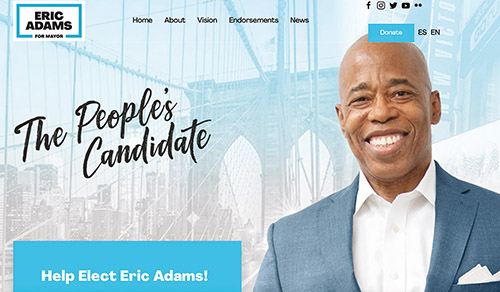
If you are looking for a candidate with credentials that address different talents and perspectives you might want in a NYC mayor, then one might consider two-term Brooklyn Borough President Eric Adams.
The Adams for Mayor campaign did not respond to The Jewish Link’s request for an interview to prepare this news story, so all information and quotations in this article have been gleaned and annotated from other sources.
Personal History
According to the biography on his campaign website, Adams is the fourth of six children, and was born in the Brownsville section of Brooklyn. He grew up in a working-class home in South Jamaica, Queens, with a mother who was a house cleaner and cook and a father who was a butcher. He decided to pursue a career in law enforcement in his teens, after he and his brother were violently beaten by police officers.
Adams got a Bachelor of Arts degree in criminal justice from John Jay College of Criminal Justice and a Master of Public Administration degree from Marist College. He graduated from the New York Police Academy in 1984 as one of the top students in his class and completed a 22-year career on the force, retiring at the rank of captain. He cofounded 100 Blacks in Law Enforcement Who Care, an advocacy group that gained national visibility by calling attention to police brutality, racial profiling and departmental diversity.
After retiring from the force he was elected to New York State Senate in 2006, serving four terms, then won election to become Brooklyn Borough President in 2013. He was re-elected in 2017.
Positions on Jewish Community Concerns
Adams has stated that his mayoral administration “will have a zero tolerance policy towards hate crimes,” will prioritize assisting non-English speaking victims to make it easier to report crimes, and will support “expanded anti-hate curriculums in our public schools.” He has taken the current mayor to task for shortcomings in communicating COVID-19 concerns to the city’s haredi community, stating in an interview in the New York Jewish Week (April 12):
“This is a diverse city with many different languages and many different cultures. We have to communicate in those languages and cultures to get the message out … we should have used credible messengers … to communicate effectively on the ground, while collaborating actively with trusted newspaper, radio and digital media. (And) enforcement should be done in a precision manner, so as not to penalize the large portions of the community that are abiding by restrictions.”
He amplified this view in an interview with Hamodia (February 16), stating, “They treated COVID-19 as an English-speaking-only virus, that only people who read the normal tabloids would have received the information … I think the fines were wrong that were handed out. I believe they should be dismissed immediately.”
In early March he visited a Brooklyn haredi yeshiva, one of a group of yeshivot under scrutiny by New York State for possible failure to provide adequate secular education standards. As reported in The Forward (March 9), he stated: “It’s obvious that the laws are not working. The fight that the Jewish community is having is no different than the fight that the African-American and the Hispanic communities have. We must fight to change how we evaluate schools and understand the importance of culture and religion in school … Albany needs to enter a re-evaluation phase on what the cultural norms are in a culturally sensitive education.”
Adams is also unafraid to stand apart from the more progressive parts of the Democratic Party. While the Democratic Socialists of Americans has asked mayoral and city council candidates to pledge to not visit Israel, he refused and stated in an interview with UJA-Federation of NY (April 20): “I do not support the BDS movement and yes I would reject any candidate questionnaire asking me not to travel to Israel. I have traveled to Israel multiple times … And I look forward to traveling to Israel again as mayor.”
Lingering Concerns About Affiliation With Nation of Islam
In his first political race, an unsuccessful 1994 primary challenge to Congressman Major Owens, Adams received the support of the Nation of Islam. According to a New Yorker article at the time, Adams knocked Owens for his criticism of Louis Farrakhan, stating: “Minister Farrakhan can only fill a void that Major has left open.”
Asked about this episode in the February 16 Hamodia interview, Adams stated that he only favored the Nation of Islam’s crime-fighting program, at a time of rising crime in Black communities. “I’m not a supporter of Farrakhan. I’m a Christian. And I do not believe in the rhetoric that says anti-any group … (There was) high crime, we were having no response from the police department … that’s what I was dealing with—the crime-fighting aspects that the Nation of Islam had.”
This past October, Adams participated in a march across the Brooklyn Bridge to mark the 25th anniversary of Million Man March in Washington; the 1995 march is described by britannica.com as an activity “organized by Louis Farrakhan.” In the Hamodia interview, Adams states: “This was not Farrakhan’s march … All over the country, people were meeting together to go to Washington, DC, to rally around a common cause of Black men standing up in their communities. So it wasn’t about Farrakhan.”
An article in gothamgazette.com (December 22, 2020) notes that Adams has been implicated in ethics scandals in the past that may raise concerns among potential supporters. The article cites as one example that during his term as state senator, he was one of a few legislators identified in a state inspector general’s report as guilty of “failing to fulfill their public duty” in overseeing the bidding for casino gambling at a racetrack in Queens. The report stated that Adams’ testimony in the hearings was not credible and that he had accepted large campaign donations from the company that won the contract.
By Harry Glazer










